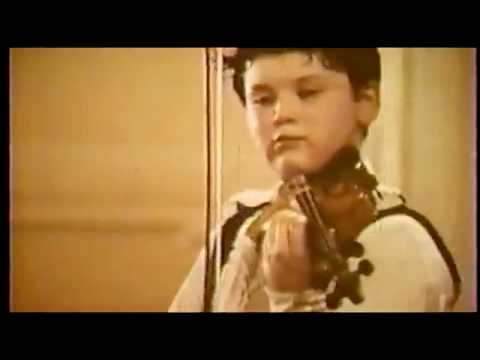Stars in short pants (10): Vadim Repin, 12
mainThe teacher is Zakhar Bron.


We hear that Stephen Rose, former head of…

The Finnish music world is in mourning for…

Singers’ agents tell us of a tsunami of…

The management of the most historic opera house…

Session expired
Please log in again. The login page will open in a new tab. After logging in you can close it and return to this page.
My great-aunt, who was close to Menuhin’s former nanny, once told me that Wunderkinder are already formed in the womb and that if you carry-out a pregnancy ultra-sound test, you won’t hear the heartbeat but Vivaldi’s Four Seasons. It explains a lot of their lack of programming imagination.
Sally
Does a pupil ever gain anything from being ranted at whilst he is playing, as happened consistently in the Tchaikovsky ?
As a rule, probably not, but apparently some exceptional pupils do.
At this level of pupil/teacher relationship perceived errors are pounced upon immediately or they can become ingrained — and this includes wrong notes but also interpretive things, as in this tape. Perhaps there is a bit of “show” being put on for the camera by Bron, but this is pretty much how two of my five fiddle teachers did things. Two teachers were very mild and nice and produced nothing in the way of results.
That is the kind of teaching I knew best both as a child beginner and as an adult well into my 60s (!) and I was never on track to become anything as a violinist, so it is not like my teachers sensed a great deal was at stake. (Maybe that proves that it does not get results! Or rather it is “necessary but not sufficient.”)
I am sorry if this seems disturbing but this is the reality, or at least one very common reality, of what produces talent at this level. I am told the “old” Hungarian piano education was even more harsh, positively brutal in fact.
I still remember my first teacher yelling at me, and this was very early in my lessons so I was not yet a teenager: “You play what’s rotten! Play what’s written!” I won’t deny my eyes moistened a little. Still that was kinder than your typical high school gym teacher, as I recall. Much as I hate to recall.
That’s how education was in the former USSR. Nothing wrong with what came out of it.
Different students benefit from different teaching styles. I’m (a) not a prodigy, (b) not a violinist, and (c) not Russian, but: I had a rather wonderful teacher — I thought — in college who, when I was done playing something, would say with a look of slight concern on her face, “Very… good. I wonder if you might want to consider perhaps adding some…” followed by a list of 7 or 8 very basic things (like rhythmic integrity, beauty of tone, musical ideas) that let me know that it was not, in fact, good at all, let alone “very good.” But she said it all in such a nice tone of voice that I actually had to listen to her words to find out what she thought. I thrived under that kind of teaching, since I was getting my butt kicked without being made to feel like a worthless human being.
I had a classmate who thought the same teacher was terrible. “She’s too nice. She only says ‘oooooh, very good’ and doesn’t help you get better.” She left for a different school to study with a teacher who was known much more for swearing and throwing furniture than for the quality of his students, and she loved him. I heard her a couple of years later and she had improved a lot. (If he was my teacher, I probably would have quit.)
It’s true that younger students probably need to be ridden harder, to establish the standards they will need to maintain for the rest of their musical lives. My teacher when I was younger was very uncompromising, but a lovely person. My grandfather came to a lesson once and caught on to her immediately; our conversation afterwards was the first time I ever heard the expression “an iron fist in a velvet glove.”
Anyway, Bron might or might not be able (or willing) to vary his teaching style according to what will work for a particular student; but if this is how he teaches everyone, then he probably crushes a fair number of students while we only get to hear about the ones who get famous.
Of course this comment thread (sub-thread I guess) brings to mind the recent post about Shlomo Mintz and his fearsome teacher.
[Summary of that video:
• Shlomo, age 6 or 7: I don’t want to study with you any more, it’s too hard.
• Ilona Feher: This is because you are WEAK! Go home and practice!
I might be exaggerating slightly.]
Childhood and innocence lost….
Are you sure about that? Do you know Vadim personally?Are you his close friend? Did he tell you this in that many words? In my encounters with Vadim (I am not a close friend of his but did work with him on several occasions) I never had an impression that he regretted the way he grew up as a child. Different children require and later value different kinds of childhoods. At least in his case, the world gained a marvelous musician with several decades of highly successful career.